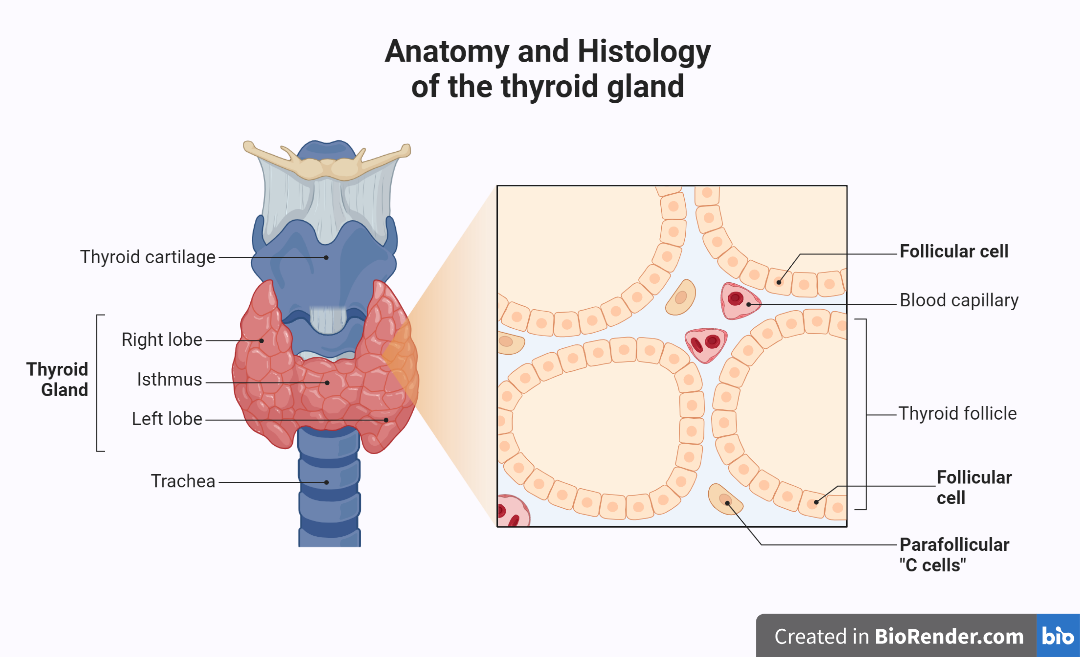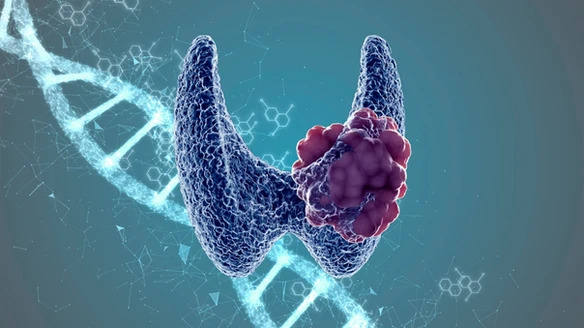- Marcos Santos, Ph.D
- 0 Comments
- 817 Views
Thyroid cancer is the most common cancer of the endocrine system¹ and affects three times more women than men. Although it has a good outcome when detected early, it is important to be aware of the signs of the disease. Check out more information throughout this content.
Thyroid Cancer in Brazil
Data from the National Cancer Institute (INCA)¹ estimate that approximately 16,660 new cases of thyroid cancer (1,830 in men and 11,950 in women) will be diagnosed annually in Brazil, making it the 5th most common type of cancer in women.

How Thyroid Cancer Develops
The thyroid is an organ of the endocrine system responsible for various functions in our body’s metabolism. It is located in the neck, in front of the “Adam’s apple” as observed in the figure below, and the changes that occur in the cells of the organ are what initiate cancer. Cancer is a term that denotes a malignant disease that originates from the uncontrolled and abnormal growth of cells, which form tumors. When cancer originates in epithelial tissues, such as the skin or mucous membranes, it is called carcinomas.

Carcinoma is formed from the cells that make up the thyroid, namely follicular cells and C cells (parafollicular cells), which influence the type of cancer, the level of aggressiveness of each neoplasm, and its respective treatment².
There is More Than One Type of Thyroid Cancer
The types of thyroid cancers are:
- Papillary Carcinoma: This is the most common type of thyroid cancer, representing about 70 to 85% of cases. It can occur at any age and has a slow growth rate. In some cases, it can spread to the lymph nodes. However, it has a high cure rate.
- Follicular Carcinoma: This is less common than papillary carcinoma and accounts for 10% of thyroid cancer cases.
- Medullary Carcinoma: This is a rare type of cancer that affects 5% of patients diagnosed with thyroid cancer, of which 25% are hereditary¹.
- Anaplastic Carcinoma: This is the most aggressive type of thyroid cancer and tends to respond poorly to treatment. It occurs in about 1 to 2% of cases, predominantly in women over 60 years of age.
Most Common Symptoms of Thyroid Cancer
The most common symptoms³ of possible thyroid cancer are:
- Visible or palpable nodules or lumps in the neck. They generally do not cause pain.
- Swelling in the neck.
- Pain in the front region of the neck.
- Hoarseness or difficulty speaking.
- Difficulty swallowing.
- Difficulty breathing.
- Persistent cough unrelated to respiratory illnesses.
These symptoms can also be caused by other diseases, non-cancerous conditions, or even other types of cancer in the head and neck region. It is important to note that thyroid cancer usually presents as a lump or nodule in the thyroid, but in the majority of cases, thyroid nodules are not indicative of cancer and are mostly benign. If you experience any of these symptoms, talk to your doctor.
Diagnosing Thyroid Cancer
Thyroid nodules are often found incidentally during a neck examination or imaging tests such as computed tomography or ultrasound. In general, blood tests such as TSH do not help to detect or diagnose thyroid cancer because their results are usually normal even when cancer is present².
When a suspicious nodule is detected on an ultrasound, the doctor usually recommends a fine needle aspiration biopsy (FNA). This procedure provides clearer information about the characteristics of the cells within the nodule and can accurately determine whether it is cancerous or not. However, up to 30% of FNA samples are classified as indeterminate, which means that the biopsy could not determine whether the nodule is cancer or not.
What to Do When the Biopsy is Indeterminate?
The most common medical approach when a nodule is classified as indeterminate is to perform a diagnostic surgery. This procedure involves the partial or total removal of the thyroid, followed by an analysis of the nodule to determine whether it was malignant or not. An alternative to diagnostic surgeries is the use of the mir-THYpe full molecular test. Based on the previously performed FNA, this test can inform whether the originally indeterminate nodule is potentially “benign” or “malignant”, avoiding unnecessary surgeries if the nodule is reclassified as benign.
What to Do if the Nodule Requires Surgery?
The treatment of thyroid cancers usually starts with surgery. However, it is important to note that the extent of the surgery varies depending on each case, such as the removal of only the lobe involved with the cancer, called lobectomy, or the removal of the entire thyroid, called total thyroidectomy. Molecular tests can be useful in this case. The mir-THYpe pre-op test analyzes molecular markers of the nodule, which can predict its aggressiveness and help the physician plan the personalized extent of the surgery that the patient will need to undergo.
Please note that this text is for informational purposes only, and its information does not replace a medical consultation. The management of each patient should always be determined by the attending physician.
References:
- INCA – Instituto Nacional de Câncer – https://rbc.inca.gov.br/index.php/revista/article/view/2243/1394 / https://www.gov.br/inca/pt-br/assuntos/cancer/tipos/tireoide
- American Thyroid Association – https://www.thyroid.org/thyroid-cancer/
- American Cancer Society – https://www.cancer.org/cancer/thyroid-cancer/detection-diagnosis-staging/signs-symptoms.html








